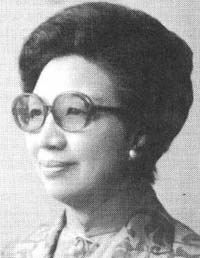|
dressed me in beautiful new clothes.
She had gathered the items we would
need and several farmers had come to carry them for us. We were to go in a small
car, pulled
by a young man, and I was delighted
when my grandmother invited me to sit right beside her. Along
the country road I could
see beautiful
wild
flowers—so lovely and sweet-smelling.
I talked, laughed, and sang all
the way to the monastery.
I was so badly
disappointed! What a terrible
monastery it was! I could not image it could
even be called
a "monastery" because no monastery I'd
ever seen before looked like
this one. The buildings
had been burned and gutted by fire, the Buddhas all destroyed by
"anti-superstition people"--crazy ghosts, as my
grandmother called them. I could
not
understand why my grandma left
her very comfortable beautiful
home and moved into that
terrible
monastery. I couldn't
believe that I could
stay there even one day; the only
thing I
wanted to do at that time was cry!
Years passed and when I was twelve
my parents ordered me to return home to study at a junior middle
school
at the capital
of the province. How very sorry I was to go, because I loved
my grandmother deeply
and I also
didn't want to leave
the monastery. For by that time everything had changed. During those six years, the monastery had improved day by day until
it was completely
renovated. No one would
have believed
that an old
woman like
my grandmother could have been so bold as to offer her body and life
and all her money to repair a destroyed monastery. But it truly
happened!
By the time my grandmother was eighty
years old,
she had completely
restored
the monastery to its original
glory.
Everyone could
feel
my grandma's spirit
in every inch of the land,
in every
corner of the buildings.
Even the
flowers
could
tell
you how wonderfully
my grandmother had done!
Dr. Liu,
obedient to her parents'
wishes, finished her schooling
and was graduated with an
M.D. in General
Medicine from China-Fukien Medical
College.
Thereafter, she resided as
a physician and acupuncturist in a public
hospital
in Taiwan for twenty-seven years. She
married and raised her sons and daughter during those years.
Following
their move to America,
the Liu's went to Gold
Wheel
Temple
in Los Angeles to
pay their respects to the Venerable
Master Hsuan Hua.
Shortly
after their first visit to the
temple,
they asked to take refuge
and bow to the Venerable Abbot as their teacher. Hearing about the City of Ten Thousand Buddhas,
Mr. Liu was irresistibly
drawn there. After several
visits, the Liu's began making arrangements to move to the City. And soon.
Dr. Liu, whose Dharma
name is Kuo Ai,
found herself
returning to monastic grounds to make her home! No
disappointment greeted her arrival
this time,
for the City's clear atmosphere was exhilarating
and yet somehow calming, the buildings
were strong, well-kept, and lay
in readiness, and the
plants
and animals
willing
to share the abundance of this efficacious place
with gentle friends. And yet there were some moments of anxiety,
for Kuo Ai was keenly
set on continuing
her practice of healing
through the arts of acupuncture here in the West. How would
she begin?
Would people
be receptive? Doubts plagued
her in those first weeks at the City. Determined
to serve, in much the same spirit as her grandmother before her, she cast aside the
doubts and
relied
on mindfulness of Kuan Yin Bodhisattva, the greatly
kind and greatly compassionate
Bodhisattva of healing,
to assist her. Under the auspices of the
Sino-American Buddhist
Association, the
East-West Medical
Clinic
was established,
and day by day Dr. Liu's
patients
found comfort under her skilled
hands. They would
describe their benefits to relatives
and
friends and in this way,
more and more people
came to receive treatments.
Kuo Ai firmly
believes
in preventative medicine. One example
of this is the way acupuncture can help
people
who wish to lose weight or to stop smoking.
Much of the secret to the success of these treatments in Dr. Liu's
case is found in the care with which she is attentive to each patient. She
discusses with them the difficulties
they have encountered when they have tried to quit smoking or to lose
weight in the past. Once the patient describes these discomforts that
accompany withdrawal
from excessive food or from cigarettes.
Dr. Liu treats the patient for
these related symptoms at the same time she
helps them directly cut off the habits of over-eating
and smoking. Such compassionate regard
for each patient's whole system takes time
and patience which Kuo Ai willingly gives. Profit
and fame, the pitfalls of many professional
people, do not tempt her. She will sacrifice
her own time for the sake of a patient's
schedule; she will aim at healing the patients
so they need not return for further treatments,
rather than prolonging the cure in order
to reap the profits of additional visits. She
assesses the kind of illness a patient has and
will tell them frankly if acupuncture is not
an appropriate or even the most effective aid
in each case. If it is not, she will refer them
to other sources rather than treat them. She
asks for less than minimum recompense for treatments
which in large cities or in places familiar
with acupuncture would cost double or triple.
Forgetting herself for the sake of others,
she relies on the strength and dharmas of
Great Compassion to help relieve peoples' suffering and enable them to attain
comfort.
|
